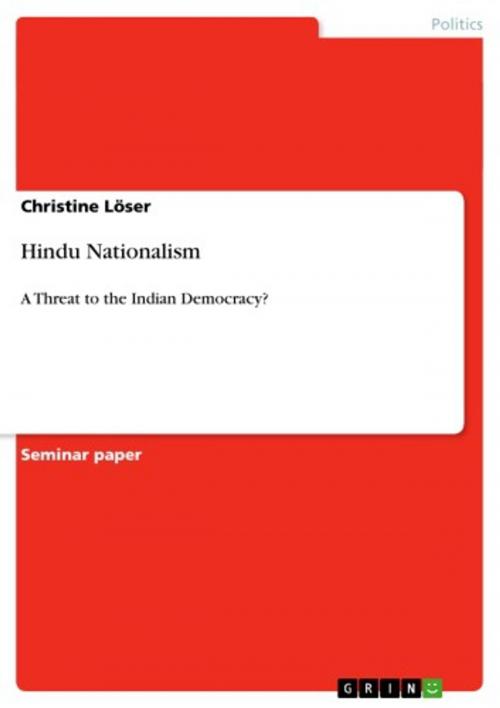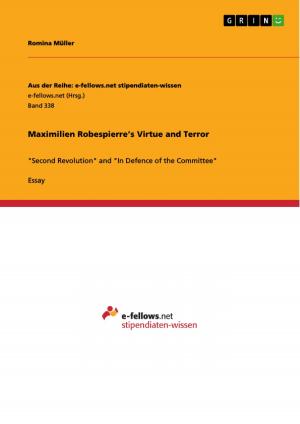Hindu Nationalism
A Threat to the Indian Democracy?
Nonfiction, Social & Cultural Studies, Political Science, Government, Public Affairs & Administration| Author: | Christine Löser | ISBN: | 9783640915637 |
| Publisher: | GRIN Publishing | Publication: | May 16, 2011 |
| Imprint: | GRIN Publishing | Language: | English |
| Author: | Christine Löser |
| ISBN: | 9783640915637 |
| Publisher: | GRIN Publishing |
| Publication: | May 16, 2011 |
| Imprint: | GRIN Publishing |
| Language: | English |
Seminar paper from the year 2011 in the subject Politics - International Politics - Region: Other States, grade: 1,3, University of Hannover (Institut für Politische Wissenschaft), course: Ethnicity, Nationalism, Racism - the problem and power of identities, language: English, abstract: This essay addresses the question whether Hindu nationalism is a threat to democracy or not and if so in what sense it has threatened democracy. The question is why this topic is so relevant. Every now and then we hear about violent riots in India, read it in the papers or watch it in the TV news. Many times these riots are caused by different religious groups: on the one hand Hindus, on the other hand minorities, mostly Muslims, Sikhs or Christians. A reason for this is the rise of a Hindu right. The phenomenon of Hindu nationalism has already been discussed in research for some time, but only in the past few years, a discussion outside India has begun whether or not it might be a threat to the biggest democracy in the world. The public in the Western hemisphere is probably completely ignorant about this topic, especially as Islamism has threatened the Europeans and Americans a lot more. Another aspect is that a lot can be learnt about how religious nationalism can threaten democracy. So, why is Hindu nationalism such an interesting subject now? It is due to the fact that Hindu religion is such an important aspect, mainly the base, of this nationalism since common religion is admittedly many times part of a nation's roots according to scholars but usually not defined as the boundary for what is inside. Additionally, the idea of a Hindu community is a perfect example of the European idea of nationalism brought to a (former) colony. This essay is structured in the following way: First of all, the theoretical fundamentals are laid by explaining what 'nationalism' and a 'nation' is. It then proceeds by describing the Indian democracy based on its Constitution and the Congress System, both playing an important role in the rise of Hindu nationalism. The essay then refers to Hindu nationalism itself, portraying its historical development in the 20th century, illustrating the ideological basis with the concepts of Savarkar and Golwalkar on which it is based and the actors of Hindu nationalism on the level of the state. This is followed by an analysis of the influence of Hindu nationalism on the Indian democracy. The paper finishes with a conclusion.
Seminar paper from the year 2011 in the subject Politics - International Politics - Region: Other States, grade: 1,3, University of Hannover (Institut für Politische Wissenschaft), course: Ethnicity, Nationalism, Racism - the problem and power of identities, language: English, abstract: This essay addresses the question whether Hindu nationalism is a threat to democracy or not and if so in what sense it has threatened democracy. The question is why this topic is so relevant. Every now and then we hear about violent riots in India, read it in the papers or watch it in the TV news. Many times these riots are caused by different religious groups: on the one hand Hindus, on the other hand minorities, mostly Muslims, Sikhs or Christians. A reason for this is the rise of a Hindu right. The phenomenon of Hindu nationalism has already been discussed in research for some time, but only in the past few years, a discussion outside India has begun whether or not it might be a threat to the biggest democracy in the world. The public in the Western hemisphere is probably completely ignorant about this topic, especially as Islamism has threatened the Europeans and Americans a lot more. Another aspect is that a lot can be learnt about how religious nationalism can threaten democracy. So, why is Hindu nationalism such an interesting subject now? It is due to the fact that Hindu religion is such an important aspect, mainly the base, of this nationalism since common religion is admittedly many times part of a nation's roots according to scholars but usually not defined as the boundary for what is inside. Additionally, the idea of a Hindu community is a perfect example of the European idea of nationalism brought to a (former) colony. This essay is structured in the following way: First of all, the theoretical fundamentals are laid by explaining what 'nationalism' and a 'nation' is. It then proceeds by describing the Indian democracy based on its Constitution and the Congress System, both playing an important role in the rise of Hindu nationalism. The essay then refers to Hindu nationalism itself, portraying its historical development in the 20th century, illustrating the ideological basis with the concepts of Savarkar and Golwalkar on which it is based and the actors of Hindu nationalism on the level of the state. This is followed by an analysis of the influence of Hindu nationalism on the Indian democracy. The paper finishes with a conclusion.















